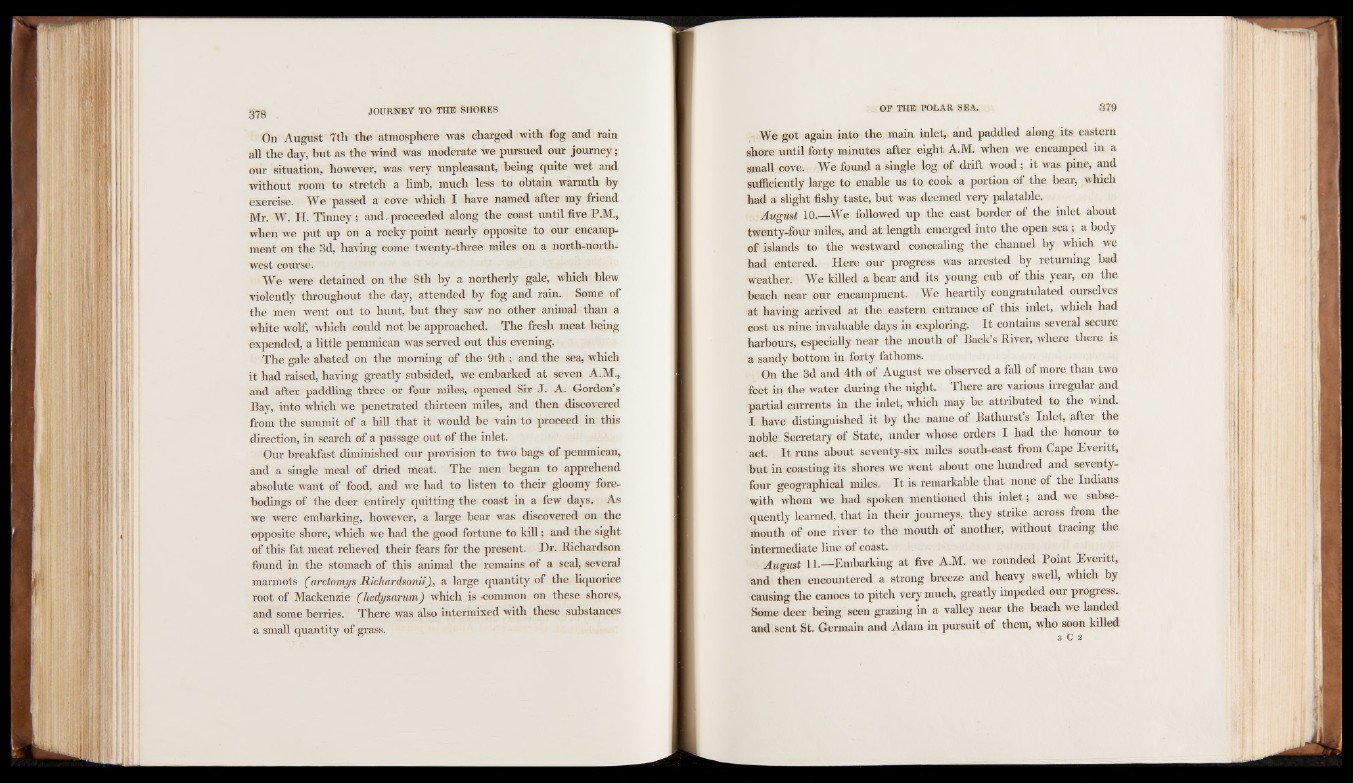
On August 7th the atmosphere was charged with fog and rain
all the day, but as the wind was moderate we pursued our journey*
our situation, however, was very unpleasant, being quite wet and
without room to stretch a limb, much less to obtain warmth by
exercise. We passed a cove which I have named after my friend
Mr. W. H. Tinney ; and, proceeded along the coast until five P.M.,
when we put up on a rocky point nearly opposite to our encampment
on the 3d, having come twenty-three miles on a north-northwest
course.
We were detained on the 8th by a northerly gale, which blew
violently throughout the day, attended by fog and rain. Some of
the men went out to hunt, but they saw no other animal than a
white wolf, which could not be approached. The fresh meat being
expended, a little pemmican was served out this evening.
The gale abated on the morning of the 9th ; and the sea, which
it had raised, having greatly subsided, we embarked at seven A.M.,
and after paddling three or four miles, opened Sir J. A. Gordon’s
Bay, into which we penetrated thirteen miles, and then discovered
from the summit of a hill that it would be vain to proceed in this
direction, in search of a passage out of the inlet.
Our breakfast diminished our provision to two bags of pemmican,
and a single meal of dried meat. The men began to apprehend
absolute want of food, and we had to listen to their gloomy forebodings
of the deer entirely quitting the coast in a few days. As
we were embarking, however, a large bear was discovered on the
opposite shore, which we had the good fortune to kill; and the sight
of this fat meat relieved their fears for the present. Dr. Richardson
found in the stomach of this animal the remains of a seal, several
marmots (arctomys Richardsonii), a large quantity of the liquorice
root of Mackenzie ( hedysarwnJ which is common on these shores,
and some berries. There was also intermixed with these substances
a small quantity of grass.
We got again into the main inlet, and paddled along its eastern
shore until forty minutes after eight A.M. when we encamped in a
small cove. We found a single log of drift wood ; it was pine, and
sufficiently large to enable us to cook a portion of the bear, which
had a slight fishy taste, but was deemed very palatable.
August 10.—We followed up the east border of the inlet about
twenty-four miles, and at length emerged into the open sea ; a body
of islands to the westward concealing the channel by which we
had entered. Here our progress was arrested by returning bad
weather. We killed a bear and its young cub of this year, on the
beach near our encampment. We heartily congratulated ourselves
at having arrived at the eastern entrance of this inlet, which had
cost us nine invaluable days in exploring. It contains several secure
harbours, especially near the mouth of Back’s River, where there is
a sandy bottom in forty fathoms.
On the 3d and 4th of August we observed a fall of more than two
feet in the water during the night. There are various irregular and
partial currents in the inlet, which may be attributed to the wind.
I have distinguished it by the name of Bathurst’s Inlet, after the
noble Secretary of State, under whose orders I had the honour to
act. It runs about seventy-six miles south-east from Cape Everitt,
but in coasting its shores we went about one hundred and seventy-
four geographical miles. It is remarkable that none of the Indians
with whom we had spoken mentioned this inlet; and we subsequently
learned, that in their journeys, they strike across from the
mouth of one river to the mouth of another, without tracing the
intermediate line of coast.
August 11.—Embarking at five A.M. we rounded Point Everitt,
and then encountered a strong breeze and heavy swell, which by
causing the canoes to pitch very much, greatly impeded our progress.
Some deer being seen grazing in a valley near the beach we landed
and sent St. Germain and Adam in pursuit of them, who soon killed s C 2